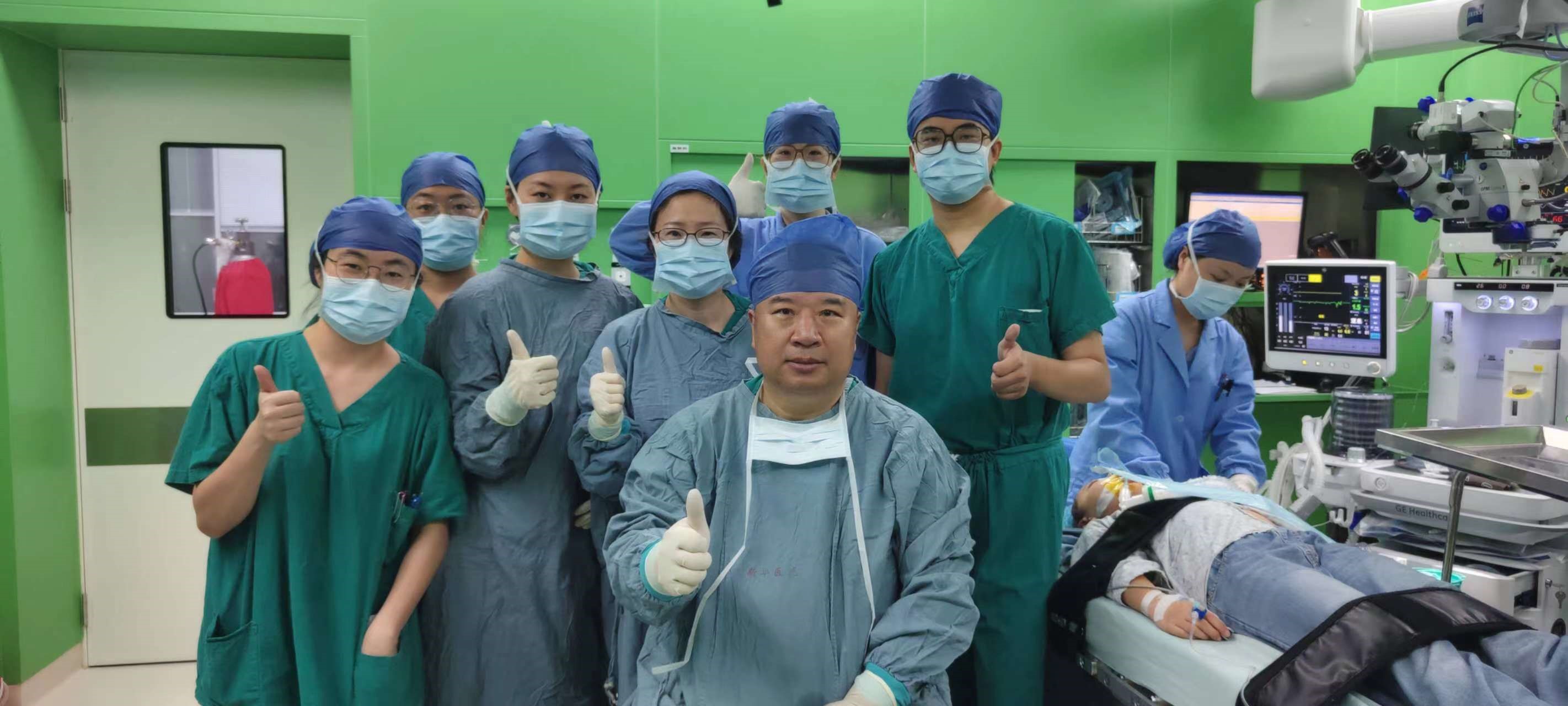

HuidaGene Therapeutics Announces Last Patient Dosed in Clinical Trial of HG004 for the Treatment of Leber Congenital Amaurosis
· HG004 is a one-time, direct-to-RPE treatment of Leber Congenital Amaurosis (LCA)
· ~25-fold lower vector doses than other AAV2 gene therapy studies for LCA2 to be tested in this clinical trial
SHANGHAI and CLINTON (NJ), October 25, 2023 – HuidaGene Therapeutics (辉大基因,“HuidaGene”), a global clinical-stage biotechnology company focused on developing CRISPR-based programmable genomic medicines, today announced the final dosing of the last patient in the first clinical trial (NCT06088992) of HG004, or the LIGHT (Leber congenital amaurosis Inherited blindness of Gene tHerapy Trial) study, for the treatment of Leber Congenital Amaurosis (LCA) associated with mutations in RPE65 gene. This clinical trial is initiated by Prof. Peiquan Zhao and his team in Xinhua Hospital affiliated to Shanghai Jiao Tong University School of Medicine.

Prof. Peiquan Zhao, Director of Ophthalmology, and the team at Xinhua Hospital affiliated to Shanghai Jiao Tong University School of Medicine
“We saw substantial restoration of vision in patients living with LCA who have no approved treatment options currently in China,” said Prof. Peiquan Zhao, Department of Ophthalmology at Xinhua Hospital affiliated to Shanghai Jiao Tong University School of Medicine. “After only a single, one-time administration, all of the patients given HG004 had improvement in retinal sensitivity and there were no serious adverse events, including retinal detachment, have been observed. The final dosing of the last patient in this study is a significant milestone to patients with LCA and the scientific community in China. Thus far, HG004 has a positive, meaningful impact on the lives of LCA patients with declining vision.”
Developed by HuidaGene, HG004 uses recombinant adeno-associated virus serotype 9 (AAV9) vector to deliver a functional human RPE65 gene into the retina and to restore, treat, and prevent blindness of children and adults with LCA associated with mutations in RPE65 gene. HG004 is the first China independently-developed AAV ophthalmic gene therapy drug granted both orphan drug designation (https://www.prnewswire.com/news-releases/huidagene-receives-orphan-drug-designation-for-gene-therapy-of-blindness-301787815.html) and rare pediatric disease designation (https://www.prnewswire.com/news-releases/huidagene-therapeutics-receives-fda-rare-pediatric-disease-designation-for-hg004-to-treat-inherited-blindness-301894514.html) by the U.S. Food and Drug Administration (FDA) . The HG00402 multinational, master-protocol clinical trial for inherited retinal dystrophies caused by RPE65 mutations (RPE65-IRDs) has also been cleared by U.S. FDA and Center for Drug Evaluation (CDE) of China National Medical Products Administration (NMPA) this year.
“We’re grateful to the participating patients and their families, as well as investigator and researchers at Xinhua Hospital, whose contribution and dedication have played a critical role in advancing our first clinical program,” said Alvin Luk, Ph.D., M.B.A., C.C.R.A., Co-founder and Chief Executive Officer of HuidaGene. “This LIGHT clinical trial preliminarily validates that HG004 can achieve higher retinal transduction efficiency at the RPE layers by using AAV9 vector different from AAV2, thereby reducing the total vector dose and injection volume and avoiding the safety concerns such as retinal detachment while restoring retinal function. We’ll continue to work diligently on our multinational, master-protocol clinical trial of HG004 for inherited retinal dystrophies. We’re closer to achieving our goal of bringing the safest, more efficacious, and most cost-effective gene therapy treatment for LCA patients.”
About Leber Congenital Amaurosis (LCA)
Leber congenital amaurosis (LCA), a group of inherited diseases involving retinal degeneration with onset in infancy and early childhood, is the most common cause of blindness in infants and young children. LCA type 2 (LCA2) is caused by mutations in the retinal pigment epithelium-specific 65-kDa protein (RPE65) gene resulting in early and severe vision impairment of blindness, affecting roughly 20 percent of patients who live with LCA. The condition is usually identified through behaviors, including abnormal roving-eye movements (nystagmus). Most patients with LCA2 have severe visual impairment throughout childhood. As vision deteriorates over time, patients usually have total blindness by the third or fourth decade of life.
About HG00401 Clinical Trial (NCT06088992)
This multiple-cohort, dose-finding investigator-initiated trial (also known as LIGHT study) is designed to evaluate the safety, tolerability, and efficacy of a single injection of HG004 in patients with LCA2. The primary endpoint of the trial is safety and tolerability of HG004 at different doses after a single administration in both adults and children. Secondary endpoints include long-term safety, changes in best-corrected visual acuity (BCVA), and changes in visual fields. For more information, please contact: HG00401@huidagene.com or visit http://clinicaltrials.gov
About HuidaGene - 辉大基因
HuidaGene Therapeutics (辉大基因) is a global clinical-stage biotechnology company focusing on discovering, engineering, and developing novel gene-editing tools and gene therapies to rewrite the future of genomic medicine. Based in Shanghai and New Jersey, HuidaGene is committed to addressing patients’ needs globally with various preclinical therapeutic programs covering ophthalmology and neurology. We are currently advancing clinical programs of HG004 in inherited retinal disease caused by RPE65 mutations (which has been granted both ODD and RPDD by U.S. FDA), HG202 CRISPR/Cas13Y RNA-editing in neovascular age-related macular degeneration (nAMD), and our preclinical pipeline, including programs HG301 CRISPR/Cas12 DNA-editing in retinitis pigmentosa, HG204 CRISPR/Cas13Y RNA-editing in neurodevelopmental disease of MECP2 duplication syndrome (MDS) (which has been granted RPDD by U.S. FDA), and HG302 CRISPR/Cas12 DNA-editing in neuromuscular diseases of Duchenne muscular dystrophy (DMD) etc. Company’s CRISPR-based therapeutics offer the potential to cure patients with life-threatening conditions by repairing the cause of their disease. HuidaGene is committed to transforming the future of genome-editing medicine.
For more information, please visit http://www.huidagene.com
or follow us on LinkedIN at http://www.linkedin.com/company/huidagene
-
Previous
U.S. FDA Awards Both Rare Pediatric Disease and Orphan Drug Designations to HG204, a CRISPR RNA-editing Therapy, for the Treatment of MECP2 Duplication Syndrome
-
Next
HuidaGene Therapeutics Announces 13 Presentations at the Upcoming European Society of Gene and Cell Therapy (ESGCT) Annual Meeting
recommendations
-
Dec 12,2024
HuidaGene Therapeutics Initiates M.U.S.C.L.E. Clinical Trial of HG302 for Duchenne Muscular Dystrophy and Completes First Patient Dosed
-
Apr 11,2025
HuidaGene at CRISPR MEDiCiNE 2025: A Celebration of Progress, Promise, and Patients
-
Nov 04,2024
HuidaGene Therapeutics Receives the First-Ever FDA Clearance of CRISPR/Cas13 RNA-Editing HG202 for Macular Degeneration
-
Dec 06,2024
HuidaGene Therapeutics Announced First Patient Dosed in the HERO Clinical Trial of HG204 for MECP2 Duplication Syndrome